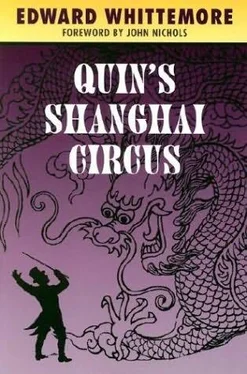Edward Whittemore - Quin’s Shanghai Circus
Здесь есть возможность читать онлайн «Edward Whittemore - Quin’s Shanghai Circus» весь текст электронной книги совершенно бесплатно (целиком полную версию без сокращений). В некоторых случаях можно слушать аудио, скачать через торрент в формате fb2 и присутствует краткое содержание. Жанр: Фэнтези, на английском языке. Описание произведения, (предисловие) а так же отзывы посетителей доступны на портале библиотеки ЛибКат.
- Название:Quin’s Shanghai Circus
- Автор:
- Жанр:
- Год:неизвестен
- ISBN:нет данных
- Рейтинг книги:3 / 5. Голосов: 1
-
Избранное:Добавить в избранное
- Отзывы:
-
Ваша оценка:
- 60
- 1
- 2
- 3
- 4
- 5
Quin’s Shanghai Circus: краткое содержание, описание и аннотация
Предлагаем к чтению аннотацию, описание, краткое содержание или предисловие (зависит от того, что написал сам автор книги «Quin’s Shanghai Circus»). Если вы не нашли необходимую информацию о книге — напишите в комментариях, мы постараемся отыскать её.
Quin’s Shanghai Circus — читать онлайн бесплатно полную книгу (весь текст) целиком
Ниже представлен текст книги, разбитый по страницам. Система сохранения места последней прочитанной страницы, позволяет с удобством читать онлайн бесплатно книгу «Quin’s Shanghai Circus», без необходимости каждый раз заново искать на чём Вы остановились. Поставьте закладку, и сможете в любой момент перейти на страницу, на которой закончили чтение.
Интервал:
Закладка:
These vigorous water games lasted for perhaps an hour. Adzhar then tucked one of them under each arm and carried them into the living room. Adzhar lived in Japanese fashion, so the entire room could serve as a bed if one were used to lying on tatami , which of course all three were. The great-grandmother was afraid the hot water might have weakened him, and urged him to rest while she gave him a massage. Adzhar agreed to the massage but found it impossible to rest. While she walked on his back he busied himself with the great-granddaughter.
And so it went for hours and hours as the weather grew hotter and hotter. Adzhar never slackened, never stopped making love. Sometime in the course of the evening, small as he was, he managed to carry the two of them out to the kitchen, making love all the while, and get a bottle of iced vodka and a jar of iced caviar out of the refrigerator. These he consumed back in the living room without interrupting himself.
At midnight, while copulating with both of them in alternate thrusts, the heart attack struck.
They heard him groan, naturally they were groaning themselves. The three simultaneous orgasms lasted throughout the twelve chimes of the clock, at which time Adzhar turned eighty and died.
Hours passed before the old woman and the young girl had the energy to crawl over to the telephone. They were too weak to speak, but we understood from the panting over the phone that something had happened. Lotmann and I hurried over and found Adzhar lying on his back, his member still erect, the same grateful smile on his face that he had worn that morning when he walked into the bath and found his housekeeper and her great-granddaughter there by chance.
Lotmann and I pronounced our various Catholic and Buddhist and Jewish and Shinto prayers over the little old man. We carried him up to a pine grove on a hill behind Kamakura and there, as he had wanted, buried him in an unmarked grave with his head pointing to the east.
A strange and restless journey? Could he have been that man who traveled out of the west to visit the court of Kublai Khan in the thirteenth century?
I don’t know. I only know that on the day Adzhar reached the end of his remarkable wanderings Japanese troops crossed the Marco Polo Bridge outside of Peking and brought war to all of China.
Quin poured the last of the whiskey into Father Lamer-eaux’s glass. The Jesuit’s hand shook a little as he stiffly buttoned his coat the wrong way, but the only effect of the alcohol still seemed to be to recall a small part of that brilliance of memory that had once allowed him to memorize the entire Summa theologica , that in its day had reinforced an inner vision so unwavering it had been stared down only once, by the glass eye of a sleeping man, and even then only after a full hour of unblinking silence.
Father Lamereaux sipped.
And the other one? said Quin. The one known as Rabbi Lotmann?
Yes, whispered the priest, there had been three of us who were friends in Kamakura before the war and now there were only two. Lotmann, as it turned out, like Adzhar, was also affected late in life by the founding of the Third International.
As a young man at the beginning of the century his interests were archery and the paintings of the Impressionists. Because he had the vast Kikuchi landholdings behind him, he could indulge himself and did, making frequent trips to Paris before the First World War to increase his collection of paintings. In 1919, already middle-aged, he was off again.
A fellow passenger on the Trans-Siberian Express was Katayama Sen, who was on his way to Moscow to become a founding member of the Comintern. Baron Kikuchi was too much of an aesthete to care for politics, but his countryman’s zeal impressed him so much on the long trip that when he arrived in Paris he cabled for his collection to be sold and turned over the proceeds, as prearranged, to a Comintern representative in Paris. The address he was sent to was a shoemaker’s shop. The agent, of course, was Adzhar. They took an immediate liking to each other.
Customarily the Baron stopped in Egypt to rest for a month or two before continuing on his voyage home from Europe. As an aesthete he enjoyed contemplating both the symmetry of the pyramids and the regularities of the Temple of Karnak. This time, however, he chose to tarry in Jerusalem rather than in Cairo. There he toured the normal spectacular sights, the Via Dolorosa, the garden of St. Ann’s, the Dome of the Rock, the Wall. Not only did he find himself remaining longer in the Middle East than usual but he also found himself, gradually, falling under the spell of Judaism.
What is inevitable appears to be inevitable. Baron Kiku-chi converted and began his training as a rabbi. At that point his title and his holdings in Japan automatically passed to his younger twin brother, younger by eight minutes, at that time a Colonel in the army but soon to become a member of the General Staff.
Before long Lotmann left Palestine and returned to Japan. There are two contradictory, or perhaps complementary, stories to explain it. One says that he was expelled from Palestine for excessive Zionist activities. The other says he was passing excessive urine at the time and had the good sense to know that medical advice in Kamakura would be vastly superior to anything available in Jerusalem.
No matter which explanation is applicable, we find the former Baron Kikuchi, now Rabbi Lotmann, taking up residence in the early 1920s on a corner of the large estate in Kamakura formerly owned by him, now the property of his brother.
By nature he was a delicate man. Just as Adzhar grew more sensual in his old age, an ineluctable process, Lotmann grew more ethereal. His favorite prophet was Elijah and he used to claim he heard the same still, small voice in his garden in Kamakura that Elijah had heard on Mt. Horeb.
So perhaps his death, after all, wasn’t the accident it appeared to be.
In the spring of 1945 the Americans were burning down Tokyo with their fire bombs. Lotmann was working on his Talmudic translations in the garden, as usual, when he heard a raid beginning over Tokyo. But the Americans never bombed Kamakura, so there was nothing to fear. Lotmann went on writing under the cloudy spring sky.
At noon the sun suddenly broke through the clouds, an unusually bright sun for a spring day. Either one of the American bombardiers was momentarily blinded by the rich colors of the earth thus revealed, or else the sudden heat of the sun stirred a current of wind in some peculiar fashion. In any case one small cluster of bombs missed Tokyo by twenty miles and fell exactly on Lotmann’s garden, instantly consuming him and all his translations in a ball of fire.
The fire burned so intensely it was out in a matter of seconds. The house and grounds were untouched. There was a black patch in the garden, otherwise nothing.
Since the death of Adzhar there had been only the two of us. Save for Lotmann and his sweet music there was no one else to comfort me. And now?
And now it came to pass as they still went on and talked that, behold, there appeared a chariot of fire and horses of fire and parted them both asunder. And Elijah went up by a whirlwind into heaven.
Father Lamereaux tipped his empty glass. He picked up the bottle and saw that it too was empty. He turned to face the window, scars appearing around his eyes.
We’ll have no second bottle today, he whispered, we’ll have no second chance in life. That other day of acting is gone, the No masks are gone and the music and the poem, gone along with all I knew, gone with all I’ve known. Once I asked myself these questions. Why does Elijah call himself Lotmann? Why does the dragon call himself Adzhar? Why is the tea bowl turned three times? Why is the koto played only once in a thousand years?
Читать дальшеИнтервал:
Закладка:
Похожие книги на «Quin’s Shanghai Circus»
Представляем Вашему вниманию похожие книги на «Quin’s Shanghai Circus» списком для выбора. Мы отобрали схожую по названию и смыслу литературу в надежде предоставить читателям больше вариантов отыскать новые, интересные, ещё непрочитанные произведения.
Обсуждение, отзывы о книге «Quin’s Shanghai Circus» и просто собственные мнения читателей. Оставьте ваши комментарии, напишите, что Вы думаете о произведении, его смысле или главных героях. Укажите что конкретно понравилось, а что нет, и почему Вы так считаете.












